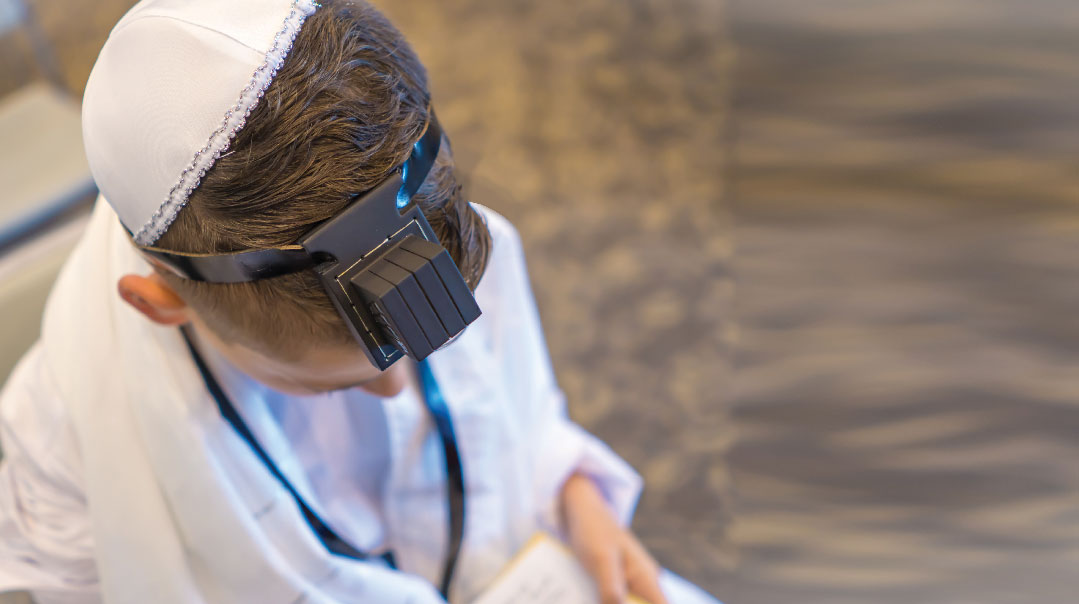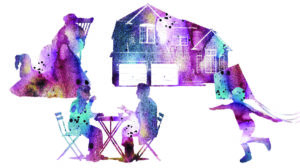Vestige of the Future

These soldiers died as Jews, I reflected, as tears fell from my eyes. Maybe I should start living as a Jew.

I
n honor of my bar mitzvah some 60 years ago, my grandfather presented me with a pair of tefillin. I laid those tefillin for the first time at the Reform temple in Jamaica Estates, New York, where my family attended services. But the rabbi there assured me that there was no need to put them on ever again.
“They’re a vestige from the past, Rich,” he declared.
I never did put on that pair of tefillin again.
After graduating high school, I went on to study media and film production in college and then continued my graduate studies in mass media, after which I was hired by a New York company that produced commercials and other television programs. I was steadily climbing the totem pole in the filmmaking industry, and was poised to vault into the Hollywood scene, when my friend David proposed a different idea.
David and I were childhood friends back from our days together in Camp Boiberik, a Yiddishist camp affiliated with the Sholem Aleichem Folk Institute. David had gone on to become an officer in the Israeli army, and he invited me to join him in Israel. I decided to take up his suggestion, thinking I would become an actor or director in Israeli theater and film and eventually enlist in the IDF’s paratrooper unit.
Frank, another friend of mine, was a leading karate instructor whom I had met while working on a film whose actors he trained in martial arts. When I told him about my plan to go to Israel, he offered to get me combat-ready.
For a year, I trained with him in Manhattan’s Alphabet City neighborhood, one of the most dangerous areas in New York at the time. By the time he finished with me, I could throw a punch as well as the neighborhood’s toughest inner-city youths.
I flew to Israel a short while before Yom Kippur of 1973. That Yom Kippur, I attended services at Jerusalem’s Great Synagogue, and when I emerged, a siren began to blare. Israel’s Arab neighbors had attacked it by surprise on the holiest day of the year.
Civilian newcomer that I was, I volunteered to join a group that was delivering morale-boosting items to Israeli soldiers in combat. I traveled with this group across the Suez Canal and brought ice cream, nuts, and books to the soldiers there. By the time I boarded the truck that would transport me back to the moshav I was staying at, on the last day of the war, I was thoroughly shaken by the death and destruction I had witnessed, but I felt gratified at having played a role in helping the soldiers and shaping Jewish history.
The truck I was traveling on was filled with sand and dirt, as well as some moist liquid. At first, I assumed that the sand was covering fruits, and that the liquid was juice that had oozed from those fruits. I soon learned the truth: the liquid was actually blood, from bodies of dead soldiers that the truck had previously transported from the battlefield for burial.
These soldiers died as Jews, I reflected, as tears fell from my eyes. Maybe I should start living as a Jew.
I made up my mind that when I would return to Jerusalem, I would do more to live as a Jew. In the meantime, I joined an Israeli theater company that was producing English-language plays. The first night I was supposed to appear onstage as an actor, I stepped off the bus in Tel Aviv and asked the first person I saw for directions to the Nachmani Theater.
That person happened to be a young chassid, and he responded to my broken Hebrew in perfect English. As it turned out, he was from Chicago, and was learning in the Belzer shul around the corner from the theater. “I’ll show you where the theater is,” he said, “but please stop by at my shul one day.”
I didn’t want him to think that a secular Jew didn’t keep his word, so one Shabbos afternoon two months later, when I again found myself in that part of Tel Aviv, I decided to clear my debt to this chassid by stopping by and saying thank you.
When I arrived, it was Shalosh Seudos time, and the chassid excitedly introduced me to his mashpia, an elderly Belzer chassid named Rav Mordechai Tachauer.
“You seem like a nice young man,” Rav Mordechai observed, in his heavy Yiddish accent. “Tell me, do you keep Shabbos? Do you eat kosher? Do you do any mitzvos?”
Hearing this scared the daylights out of me. I had come to Israel prepared for combat, but I was woefully unprepared for this, the ultimate confrontation of my life. The frail Rav Tachauer couldn’t deliver a punch, kick, or karate chop, but talking to him was putting me into a cold sweat. How could I have lived 28 years and never given serious thought to my obligations as a Jew?
“You know,” he added, seeing my confusion, “America is one big mental hospital.”
“Excuse me,” I said politely, “but you’ve never been to America, so how can you say that?”
“Don’t vurry,” he said, “I’ve seen many of the patients that come out of there. They have their fathers’ looks and they’re wearing their mothers’ jewelry.” (He was referring to the ear and body piercings ubiquitous among young men of the hippie generation.)
Rav Tachauer tried to convince me to join a yeshivah, but when I demurred he prevailed upon me to take on one mitzvah.
“Put on tefillin every day,” he urged me. “I can get you a good price on a pair.”
My bar mitzvah tefillin had long since disappeared, and I didn’t have the money for new ones. But when I returned to the moshav, I found a letter from my brother Skip with belated birthday wishes — and a check for the exact amount Rav Tachauer had said tefillin would cost.
Upon hearing that I had bought myself tefillin, my friend David asked me if I had been brainwashed.
“No,” I replied. “Actually, you and I were both brainwashed when we went to Camp Boiberik and equated Yiddish with Yiddishkeit. You know, I attended Rosh Hashanah services on your moshav, and you guys couldn’t even cobble together a minyan. So maybe these chassidim have it right, and we have it wrong?”
Shortly thereafter, I headed to Jerusalem, where I asked some friends of mine if they knew of anyone who could teach me how to put on tefillin.
“There’s a yeshivah down the block,” they replied. “Maybe someone there can help you.”
That yeshivah happened to be Ohr Somayach. There, I discovered a cadre of superstars, in both the staff and student body. One of the roshei yeshivah, a brilliant talmid chacham, sat with me and patiently taught me hilchos tefillin, like a little cheder yingel.
Another told me, “Don’t waste three years in the army. Stay here and learn. This is an opportunity you won’t have again.”
I stayed in Ohr Somayach for two years, after which I returned to America not as Rich Eichler but as Peretz Baruch Eichler, the name given to me at my bris.
While I was in Israel, my parents thought I had been captured by a cult. But when I returned, looking like a mensch — I came back wearing a suit and with trimmed hair, in place of the jeans, long hair, and mustache I had sported upon my departure — my parents were proud of me. They decided, of their own accord, to kasher the house so I would feel comfortable eating there. They also began to keep Shabbos.
“Where do you think you got this stuff from?” my mother asked, with tears in her eyes. “You think you invented it?”
Not only did my parents start moving toward observance, they also decided to pay for me to continue learning in yeshivah.
With time, I got married and settled in Lakewood. At the bris of my first son, some 30 years ago, my father cried tears of joy and nachas.
I considered returning to the showbiz industry for parnassah, but when I approached a gadol for a brachah, he advised me to open an independent filmmaking firm and carve out my own niche rather than join an established Hollywood company. I did that, and spent the next few decades producing Jewish-themed documentaries and promotional films.
Several years after I had moved to Lakewood, I was talking to my brother Skip, and I asked him if he was putting on tefillin.
“Not really,” he admitted. “I would like to, but I’m a lefty, and the tefillin I got for my bar mitzvah are meant for a right-handed person.”
“So let’s buy you a new pair,” I said. I went with him to buy the tefillin and insisted on paying for them, just as he had paid for mine when I was in Eretz Yisrael.
Years later, on the seventh day of Chanukah 2004, I returned to my car and found that the window was smashed and my tallis bag, which had been lying on the back seat, had been stolen. When I reported the theft to the Lakewood police, they told me that my religious articles had probably been stolen by someone looking for money to buy drugs, and that I would likely never see them again. Distraught, I stopped in a nearby electronics store to buy something, and while I was there I mentioned to the salespeople that my car had been broken into and my tefillin had been stolen.
“You might want to make sure your car doors are locked,” I said.
Two teenage yeshivah boys were in the store at the time, but I did not take much notice of them.
That night, which was Zos Chanukah, I attended a wedding in Bais Faiga, and these two boys came running over to me.
“Rabbi Eichler,” they said, “we found your tefillin!”
After I had left the electronics store, these boys noticed a police detective named Harry VanDisilver walking outside with a tallis bag tucked under his arm.
“Where did you get that?” they asked him.
“Well,” the detective answered, “I was on a major drug bust, and after we arrested the criminals I saw that one of the burglary officers was going to take this back to headquarters. I realized that it probably belongs to someone in the Jewish community, and since I know people in the community, I figured I’d take it back with me.”
The next morning, I hurried down to the police station, where I gave Detective VanDisilver identifying characteristics of my bag.
He returned them to me, and then, shaking his head, he said, “I want to tell you something. When I’m on a drug bust, I never take religious articles. I don’t know what made me take them today! And I’ll tell you something else — I never walk to the stationhouse. I always take my car. This is the first time in eight years on the beat that I decided to walk to the stationhouse, and that’s when those boys spotted me.
“Today is the last day of your holiday, huh?” he continued. “Well, this is a miracle. Your religious articles could have sat in our evidence locker for years and never been returned.”
Later that day, I called Skip. “Remember the tefillin you helped me buy 20 years ago?” I said. I then told him what had happened.
“Peretz,” he said, “you won’t believe this. I haven’t put on tefillin in years, but recently I decided that I want to start putting them on again. I couldn’t find the pair you bought me, though. I looked high and low but they were nowhere to be found. Last week, on the first day of Chanukah, I opened the closet, and suddenly I saw the tefillin right in front of me.”
The tefillin I had bought him were returned to him on the first day of Chanukah, and the tefillin he had bought me were returned to me on the last day of Chanukah.
Skip passed away three years ago, on 14 Kislev, having done teshuvah at the very end of his life.
About a month ago, I was invited to the bar mitzvah of a friend’s son in the Young Israel shul in the Jamaica Estates neighborhood where I grew up. That shul happened to be right across from the Reform temple where my family used to attend services.
This Young Israel contained an exhibit of remnants from the Holocaust: a yellow star, a bit of barbed wire, a pair of tefillin that had been used in the camps.
I couldn’t help but be struck by the irony of it. Sixty years earlier, in a temple across the street, a Reform rabbi had told a young Jewish boy that he need not put on tefillin, because they were a vestige of the past. And this shul, where people put on tefillin daily, housed a pair of tefillin from the past that symbolized the eternity of this mitzvah and the people who observe it.
The real vestige of the past is the Reform temple. My tefillin, on the other hand, are a vestige of the future.
To have your story retold by C. Saphir, e-mail a brief synopsis to lifelines@mishpacha.com or call +1.718.686.9339 extension 87204 and leave a message. Details will be changed to assure confidentiality.
(Originally featured in Mishpacha, Issue 791)
Oops! We could not locate your form.












